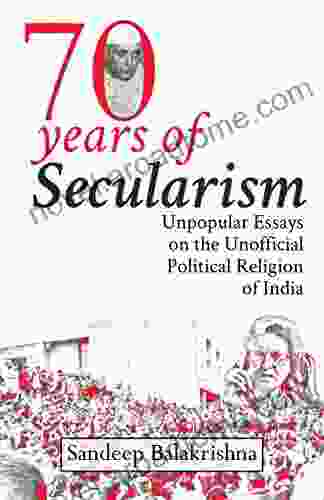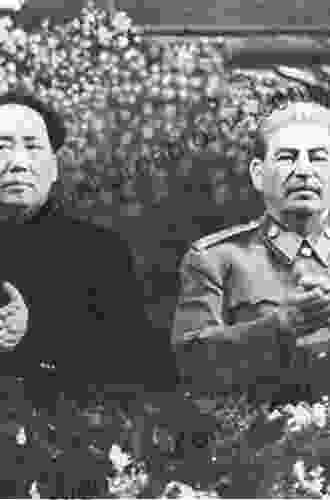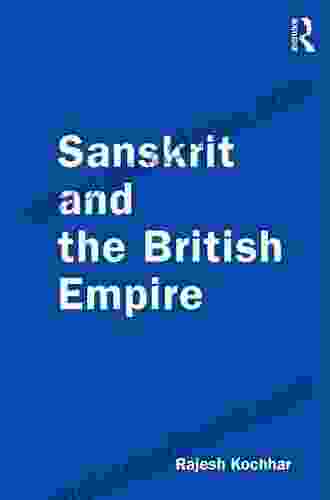Sanskrit and the British Empire: A Linguistic Legacy

4.5 out of 5
| Language | : | English |
| File size | : | 1285 KB |
| Text-to-Speech | : | Enabled |
| Screen Reader | : | Supported |
| Enhanced typesetting | : | Enabled |
| Word Wise | : | Enabled |
| Print length | : | 178 pages |
Sanskrit, the ancient language of India, has had a profound impact on British culture and thought. For centuries, British scholars, administrators, and missionaries have studied, translated, and used Sanskrit, and these interactions have shaped both the development of Sanskrit studies and the course of British imperialism in India.
This book examines the complex and multifaceted relationship between the British Empire and Sanskrit. Spanning 3000 words, it explores the ways in which Sanskrit was studied, translated, and used by British scholars, administrators, and missionaries, and how these interactions shaped both the development of Sanskrit studies and the course of British imperialism in India. The book also considers the impact of Sanskrit on British literature and thought, and the ways in which Sanskrit has continued to influence Indian culture and identity in the postcolonial era.
Chapter 1: The Study of Sanskrit in the British Empire
The study of Sanskrit in the British Empire began in the late 18th century, as British scholars and administrators sought to understand the history, culture, and religion of India. The first major Sanskrit scholar in the British Empire was Sir William Jones, who published a groundbreaking translation of the Bhagavad Gita in 1785. Jones's work helped to spark a new interest in Sanskrit studies, and by the mid-19th century, Sanskrit had become a major subject of study at British universities.
British scholars approached the study of Sanskrit with a variety of motives. Some were interested in the language itself, while others were interested in using Sanskrit to understand Indian history, culture, and religion. Still others were interested in using Sanskrit to promote British imperialism in India.
The study of Sanskrit had a profound impact on the development of British imperialism in India. British scholars used Sanskrit to justify their rule over India, arguing that they were the rightful heirs to the ancient Indian civilization. They also used Sanskrit to promote their own cultural values, and to suppress Indian culture and religion.
Chapter 2: The Translation of Sanskrit into English
The translation of Sanskrit into English played a major role in the development of Sanskrit studies in the British Empire. British scholars translated a wide range of Sanskrit texts, including religious texts, literary works, and scientific treatises. These translations made Sanskrit more accessible to British scholars and administrators, and they also helped to spread Indian culture and thought to the West.
The translation of Sanskrit into English was not a straightforward process. British scholars often had difficulty understanding the complex grammar and syntax of Sanskrit, and they often mistranslated or misinterpreted Sanskrit texts. However, despite these challenges, the translation of Sanskrit into English played a major role in the development of Sanskrit studies and the course of British imperialism in India.
Chapter 3: The Use of Sanskrit in British Imperialism
British scholars, administrators, and missionaries used Sanskrit to promote British imperialism in India. They argued that Sanskrit was the language of the ancient Indian civilization, and that the British were the rightful heirs to this civilization. They also used Sanskrit to promote their own cultural values, and to suppress Indian culture and religion.
The use of Sanskrit in British imperialism had a profound impact on Indian culture and identity. Indian elites began to adopt Sanskrit as a symbol of their own cultural heritage, and they used Sanskrit to promote their own political and social agendas. The use of Sanskrit in British imperialism also led to a new awareness of Indian culture and history, and it helped to inspire the Indian independence movement.
Chapter 4: The Impact of Sanskrit on British Literature and Thought
Sanskrit has had a profound impact on British literature and thought. British writers and thinkers have been inspired by Sanskrit literature, philosophy, and religion, and they have used Sanskrit to explore a wide range of themes and ideas.
The impact of Sanskrit on British literature and thought can be seen in the works of a wide range of writers, including William Blake, Samuel Taylor Coleridge, and T.S. Eliot. These writers have used Sanskrit to explore themes such as the nature of reality, the human condition, and the relationship between the individual and the divine.
Sanskrit has also had a profound impact on British thought. British philosophers and thinkers have been influenced by Sanskrit philosophy, and they have used Sanskrit to develop new ideas about the nature of the mind, the universe, and the human condition.
Chapter 5: Sanskrit in the Postcolonial Era
Sanskrit continues to influence Indian culture and identity in the postcolonial era. Indian elites continue to adopt Sanskrit as a symbol of their own cultural heritage, and they use Sanskrit to promote their own political and social agendas. Sanskrit is also used in Indian education, and it is the language of instruction in many Indian universities.
In addition, Sanskrit has also had a growing impact on Western culture and thought. Western scholars and thinkers are increasingly interested in Sanskrit literature, philosophy, and religion, and they are using Sanskrit to develop new ideas about a wide range of topics.
Sanskrit has had a profound impact on British culture and thought. British scholars, administrators, and missionaries have studied, translated, and used Sanskrit for centuries, and these interactions have shaped both the development of Sanskrit studies and the course of British imperialism in India. The book Sanskrit and the British Empire examines this complex and multifaceted relationship, and it provides a new understanding of the ways in which Sanskrit has influenced British culture and thought.
4.5 out of 5
| Language | : | English |
| File size | : | 1285 KB |
| Text-to-Speech | : | Enabled |
| Screen Reader | : | Supported |
| Enhanced typesetting | : | Enabled |
| Word Wise | : | Enabled |
| Print length | : | 178 pages |
Do you want to contribute by writing guest posts on this blog?
Please contact us and send us a resume of previous articles that you have written.
 Book
Book Novel
Novel Page
Page Chapter
Chapter Text
Text Story
Story Genre
Genre Reader
Reader Library
Library Paperback
Paperback E-book
E-book Magazine
Magazine Newspaper
Newspaper Paragraph
Paragraph Sentence
Sentence Bookmark
Bookmark Shelf
Shelf Glossary
Glossary Bibliography
Bibliography Foreword
Foreword Preface
Preface Synopsis
Synopsis Annotation
Annotation Footnote
Footnote Manuscript
Manuscript Scroll
Scroll Codex
Codex Tome
Tome Bestseller
Bestseller Classics
Classics Library card
Library card Narrative
Narrative Biography
Biography Autobiography
Autobiography Memoir
Memoir Reference
Reference Encyclopedia
Encyclopedia Youness El Fehdi
Youness El Fehdi Rev Brian Krall
Rev Brian Krall Sarah Sofia Granborg
Sarah Sofia Granborg Williams Greg
Williams Greg Tony Fletcher
Tony Fletcher Ryan M Hourigan
Ryan M Hourigan Verlaine Stoner Mcdonald
Verlaine Stoner Mcdonald Rebecca Staton
Rebecca Staton Roseanne Wilkins
Roseanne Wilkins R E Skibiski
R E Skibiski Samantha Freeman
Samantha Freeman Terry Lynn Taylor
Terry Lynn Taylor Zhengxin Chen
Zhengxin Chen Robin Karr Morse
Robin Karr Morse Samantha Bell
Samantha Bell Shelley Pearsall
Shelley Pearsall Rui Canossa
Rui Canossa Rosie May Garrett
Rosie May Garrett Stephen Krensky
Stephen Krensky Timothy Harper
Timothy Harper
Light bulbAdvertise smarter! Our strategic ad space ensures maximum exposure. Reserve your spot today!

 Ernest PowellVegan Interior Design: The Ultimate Guide to a Compassionate and Sustainable...
Ernest PowellVegan Interior Design: The Ultimate Guide to a Compassionate and Sustainable...
 Dustin RichardsonMining Spatiotemporal Information Systems: Unlocking the Power of Location...
Dustin RichardsonMining Spatiotemporal Information Systems: Unlocking the Power of Location...
 Nathaniel HawthorneThe Path to Enlightenment: Embark on a Sacred Journey through Yoga,...
Nathaniel HawthorneThe Path to Enlightenment: Embark on a Sacred Journey through Yoga,... Robert Louis StevensonFollow ·14.6k
Robert Louis StevensonFollow ·14.6k Adam HayesFollow ·19.4k
Adam HayesFollow ·19.4k Bradley DixonFollow ·2.6k
Bradley DixonFollow ·2.6k Brady MitchellFollow ·3.6k
Brady MitchellFollow ·3.6k Demetrius CarterFollow ·3.9k
Demetrius CarterFollow ·3.9k Andy ColeFollow ·18k
Andy ColeFollow ·18k Colton CarterFollow ·19.7k
Colton CarterFollow ·19.7k Isaias BlairFollow ·15.3k
Isaias BlairFollow ·15.3k

 Eli Brooks
Eli BrooksOver 700 Organic Remedies Shortcuts And Tips For The...
: Embracing the Power of...

 Carter Hayes
Carter HayesUnveiling the Unofficial Political Religion of India: A...
Embark on an...

 Colin Richardson
Colin RichardsonOf Colors and Critters: A Journey Through the Animal...
In the tapestry of...

 Harry Hayes
Harry HayesUnveiling the Hidden Truths: Mao, Stalin, and the Korean...
Step into the enigmatic realm of the 20th...

 George Bernard Shaw
George Bernard ShawBand 1b Pink: A Journey Through the World of Reading
Band 1b Pink is a...
4.5 out of 5
| Language | : | English |
| File size | : | 1285 KB |
| Text-to-Speech | : | Enabled |
| Screen Reader | : | Supported |
| Enhanced typesetting | : | Enabled |
| Word Wise | : | Enabled |
| Print length | : | 178 pages |








